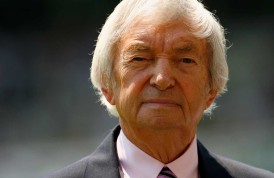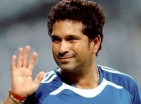The Saddest Summer
Cameron Burge |
As the title of Alan McIlvray’s book notes, The Game Goes On. Still, as Summer gives way to Autumn in the Southern Hemisphere, one cannot help but feel the celebration of cricket which is the World Cup, and indeed the whole season, has been bookended by two losses which will leave a lasting impression on the game and those who love it.
In November, the death of Philip Hughes cast a pall over the new season. When Australia and India began the rescheduled first Test in Adelaide, there could only be one man to whom the game would turn to provide a tribute; Richie Benaud. When Benaud’s touching words were played on television screens and at the Adelaide Oval, it was apparent the Voice of Cricket was himself doing it tough. There was a certain frailty and agedness to the words, which were not present before his enforced absence from the commentary box after a car accident a couple of years ago. Time was catching up with a man most thought timeless. Players came and went, but Benaud was always there. His understated wit, erudite knowledge of the game and, rarely for a man of his vintage, ability to recognise and acknowledge the skill and courage of the modern player set him apart from almost all of his colleagues. To hear of his passing this morning at 84 is both unsurprising and at the same time keenly felt.
Growing up in Australia in the 1970s and 80s, Richie Benaud was cricket. The first bat I owned was a size five County with Richie’s autograph. I cherished that bat, and still own it to this day. Even before his important role in the establishment of World Series Cricket, Benaud had made a significant contribution to the game. He played 64 test matches and, at the time of his retirement, was his country’s leading Test wicket taker. He was in the commentary box when Dennis Lillee went past that mark at the MCG in the early 1980s. Such was the respect with which Benaud was regarded, Lillee made a point of waving to him in the commentary box so the two men could share the moment. It was a fitting tribute to the man who, along with Sir Frank Worrell, played a large part in restoring the joy to Test cricket in the summer of 1960-61.
As captain, Benaud favoured attack over letting the game wander to a tame conclusion. He had an aggressive instinct, and the phrase “fortune favours the brave” might well have been invented for him. Heading to tea on the final day of the first test of that series against West Indies at six down for 109 needing 233 to win, Benaud was having a cup of tea in the dressing room and looking over the ground when approached by Sir Donald Bradman, then chairman of selectors . Taking a seat beside Benaud, Bradman sipped at his tea, looked out at the ground and asked “What are the tactics?” “We are going for the win”, replied Benaud. “I’m very glad to hear that”, said Sir Don, before taking his leave. What took place over the next two hours is the stuff of legend; the match culminating in Test cricket’s first tie, and the entire series still being regarded as one of the greatest ever played. Later, when Benaud captained a Wanderers’ side to Asia, the success of his at times outrageous tactics led to one of his players remarking “Benords, if you stuck your hand into a bucket of ****, you’d pull out a fistful of diamonds”.
Richie Benaud was one of the earliest cricketers to make use of his profile and appear in commercials. He was the Brylcreem Man in the 1960s, and appeared in commercials for Milo. As late as this year he appeared in an advertisement for Australian lamb. He took his profile and, whilst still captaining his country, began a storied career as commentator and journalist. Over the next four decades, Richie and his devoted wife Daphne lived a life without a winter, travelling between Australian summers and what passes for summer in England. In doing so, he watched and commentated on more cricket matches than anyone before or since. With the establishment of World Series Cricket in 1977, he began an association with the Nine Network which lasted until his passing.
Throughout those years, both in Australia and in England, Benaud brought an overarching dignity and style to his commentary. He never lost the ability to dissect a game – in the famous underarm one day game at the MCG, he commented in about the 42nd over that Greg Chappell had miscalculated the overs left for his bowlers and would need his brother Trevor to bowl the last. His withering dissection of the Australian captain’s tactics at the end of that game reinforced his objectivity and the fact he pulled no punches when it came to his thoughts on cricket. A few short years later, Chappell would share the commentary box with Benaud, and they would do so as friends. No grudge was kept. Benaud was the ultimate professional.
My own recollections of Richie Benaud are legion. He was ubiquitous, yet he was understated. Those who heard him commentate the denouement to the second Ashes Test in 2005 will recall his providing nothing more than a countdown of the runs required as Australia edged closer to an improbable victory. Then the climactic “Jones!!! Harmison!!!!” as Kasprowicz was given out caught behind. There was no need to say anything else. The pictures told the story, and Benaud knew they did. He instinctively knew that sometimes less is more, a lesson he passed down to the current crop of commentators, but one which all of whom have sadly forgotten.
With Benaud, commentary was never white noise. It was always incisive, often funny and invariably entertaining. As were his books, all fourteen of them. He wrote hundreds of articles for various newspapers, and they were always worth reading. He wrote and commentated as he played and captained – with élan, intelligence and with the greater good of the game at heart. Bradman once famously said it was the duty of all cricketers to leave the game in a better state than when you found it. There can be no doubt Benaud did that. He was, and will remain, one of the most influential figures in Australian and world cricket.
In many ways it is fitting that Richie Benaud’s last major appearance on our television screens was to pay tribute to a young man whose life was curtailed playing the game they both loved. Notwithstanding his age, it is plain there was a great warmth, respect and love between he and the current generation of cricketers, and indeed all those in between. He transcended the sport. To me and millions of others, he will always be the voice of summer. Despite only appearing fleetingly, he will always be my abiding memory of this summer.
The saddest summer.





well said on behalf of many that are shocked at the news of his passing. Oh the memories.
Comment by Gerard | 6:01am BST 10 April 2015
We opened our summer with sadness and we closed our summer with even more sad news and all that happened in between was nothing short of amazing. Such is life with lows and highs but one thing remains, is with those moments of happiness or sadness we are left with memories that last a lifetime and Ritchie’s passing will definitely be a long lasting one. Rest in peace
Comment by George Tamer | 7:21am BST 10 April 2015
Great article mate
Comment by Rob | 8:47am BST 11 April 2015